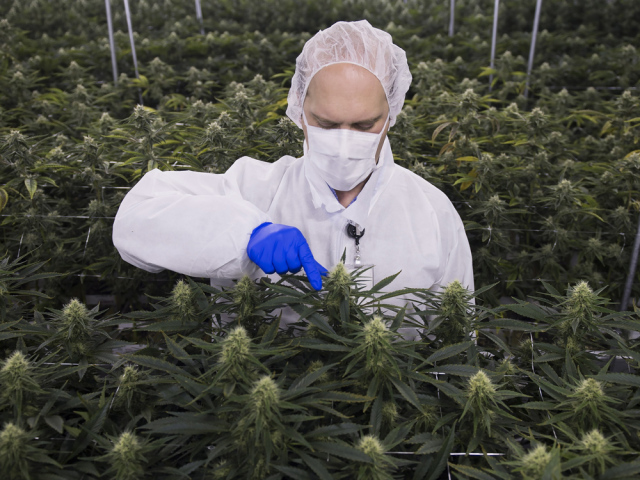Some in the industry call them “referral fees,” others “educational grants.” To at least one bioethicist, they are simply kickbacks.
Licensed producers of medical cannabis are paying millions of dollars to cannabis clinics across the country in exchange for patients who register their marijuana prescriptions with the companies, corporate documents and interviews reveal.
What just three years ago was a controversial, but sporadic, practice seems to have become a routine part of the pot business, where medicine and commerce are increasingly intertwined.
For some clinics, in fact, payments from licensed producers (LPs) represent the bulk of their income.
“LP revenue provides the highest margin of all the company’s revenue streams,” says a document filed with regulators by Sunniva Inc., which owns both Natural Health Services (NHS) clinics and a pot producer.

When someone files their prescription with a producer, that company usually pays the clinic 15 to 20 per cent of the cost of each dose of cannabis the patient buys over time, report insiders.
The operators say those payments enable the facilities to offer intensive counselling that would otherwise have to be paid for by patients. And the fact they have contracts with multiple producers, they say, means the fees do not encourage favouritism toward any one firm.
But health-policy and medical-ethics experts argue the payments still make it near-impossible for health professionals to put the patient’s interests first.
“These are kickbacks. Let’s be blunt — that’s what they are,” said Bryn Williams-Jones, a University of Montreal bioethics professor who has trained doctors on conflict of interest for years. “Regardless of whether the physician thinks they’re independent, they’re no longer independent.”
Regardless of whether the physician thinks they’re independent, they’re no longer independent
Legalization of marijuana for recreational use has, in some ways, made access to the drug as easy as buying a bottle of Chardonnay. But many Canadians still seem to want a health professional’s help getting marijuana treatment, and the medical cannabis system remains popular, say industry representatives.
Specialty clinics assess patients and issue “authorizations” for marijuana, then often help the patient register that prescription with a particular producer, typically one of those contracted with the facility.
The then-CEO of Tilray, a major B.C.-based cannabis company, complained in 2015 about clinics and doctors who were starting to demand referral fees, saying it “taints the whole industry,” and pulling out of a trade group in protest. No one at the firm, under different leadership today, was available to comment, a spokeswoman said.
But other companies’ executives say the payments are now standard practice, and help fund the care clinics provide, including appointments that can last as much as an hour.
“There’s rent and there’s staffing and payroll and insurance, and all the other things that go into running the business,” said Barry Fishman, CEO of Vivo Cannabis, which owns two clinic chains. “There needs to be a way to have a sustainable business … and it doesn’t appear the governments are providing adequate funding.”
In one corporate filing, Vivo says that it receives “educational grants” from producers, but stresses that its patient educators are not informed about the contracts with those companies, and make objective recommendations.
Clinics do receive income from the fees that some provinces, though not all, pay their doctors, but the largest chunk of revenue comes from producer payments, said Fishman.
Based on the few companies that report the transactions to regulators, the money can add up.
All but $ 100,000 of the $ 1.2 million in revenue earned by the Canada House chain of cannabis clinics in the three months ending July 31 came from producer fees, the company reported.

From the other side, medical-patient referral payments accounted for about half the $ 3.5 million in sales and marketing costs over a three-month period for pot producer MedReleaf, parent company Aurora Cannabis indicates in a recent report.
Aurora also owns the CanvasRx chain of clinics, and says in another document the clinics’ revenues jumped by $ 1.8 million in the 2018 fiscal year thanks to a surge in producer fees.
Sunniva Inc. reports that its gross profit margin (before operating expenses, interest payments and taxes) soared by $ 2.4 million in the six months ended June 30, primarily due to increases in producer revenues at its NHS cannabis clinics.
But just because clinics receive those payments, doesn’t mean the health professionals who work in them are anything but impartial, said Jordan Sinclair, a vice president of Canopy Growth, one of Canada’s biggest cannabis firms.
“There is still a doctor who has to make an assessment of the patient,” he said. “He has to demonstrate you have an actual need for the medicine.”
Willams-Jones is not convinced. Clinics say their doctors and nurse practitioners do not personally receive referral fees, but their employers’ financial relationship with producers is still a powerful force, the bioethicist says.
Clinics need to fund their services somehow, but doing it with a slice of sales of the product they prescribe should not be the answer, echoed Marc-Andre Gagnon, a health-policy professor at Carleton University.
“You have this clear conflict of interest in place: the more you prescribe, the more you get,” he said. “In principle, this is simply unacceptable.”


